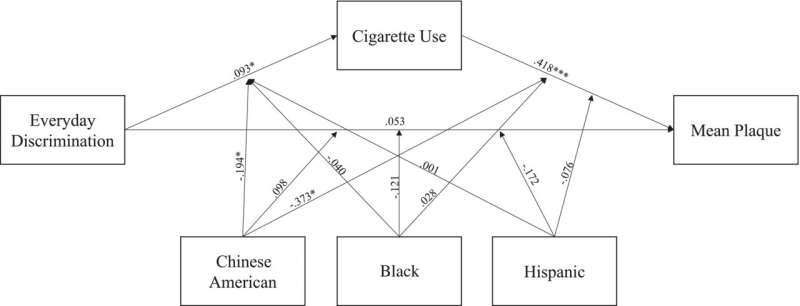This article has been reviewed according to Science X's editorial process and policies. Editors have highlighted the following attributes while ensuring the content's credibility:
fact-checked
peer-reviewed publication
trusted source
proofread
Discrimination found to smoking habits, hurting heart health

Everyday discrimination can influence unhealthy coping behaviors such as smoking, thereby increasing the risk of heart disease, according to a new study published in the Journal of the American Heart Association. However, the impact differs depending on one's identity, with Hispanic women experiencing the greatest risk for heart disease as a result of discrimination.
"Experiences of discrimination are framed by individual cultural realities and contexts," said Stephanie Cook, assistant professor of biostatistics and social and behavioral sciences at the NYU School of Global Public Health and the study's lead author. "Discrimination at the intersection of multiple marginalized identities may be particularly damaging to health."
Heart disease is the leading cause of death in the U.S., but some people are at greater risk based on their race, ethnicity, or sex. These disparities can be explained, in part, by social determinants of health—the environmental conditions in which we live that influence our health, from income and education to air pollution and access to healthy foods.
Discrimination is another social determinant of health, and research shows that stress caused by this unjust treatment can worsen heart health. This may be because discrimination changes how our physiological stress systems function, which can cause inflammation and lead to the thickening of arteries. Studies also show that being discriminated against can lead to unhealthy coping behaviors, including smoking, a well-known risk factor for heart disease.
Most research looks at the health effects of discrimination in the context of a single identity, such as race, gender, or sexual orientation. But this neglects the reality of having overlapping identities, a concept known as intersectionality.
To understand the connection between discrimination, smoking, and heart health, Cook and her colleagues analyzed data from the Multi-Ethnic Study of Atherosclerosis, a national study sponsored by the National Heart Lung and Blood Institute (NHLBI). More than 6,800 adults without a diagnosis of heart disease were asked about their health behavior, heart disease-related risk factors, demographics, and whether they feel that they are subject to discrimination.
The researchers examined the associations among discrimination, cigarette smoking, and two measures of heart health: carotid intima-media thickness and plaque in the carotid arteries, both of which are strong predictors of future cardiovascular events.
They found that discrimination had an indirect effect on measures of heart health—but only for certain populations. Hispanic women were the most affected, with greater discrimination linked to more cigarette use and, in turn, more arterial plaque. Hispanic men also experienced the impact of discrimination, with increased discrimination linked to more smoking and greater plaque and carotid intima-media thickness.
According to the researchers, the results demonstrate the importance of considering multiple identities when studying health disparities and creating interventions to improve health.
"A key takeaway from this analysis is that we need to be doing more intersectional research on cardiovascular disease," said Cook. "We are missing the links between discrimination and cardiovascular disease if we do not consider mechanisms such as smoking in the context of intersectionality. For instance, designing a program to reduce heart disease in men or women, or among certain racial groups alone, is not sufficient due to the unique lived experiences of Hispanic women, for example."
Cook completed this research as part of the NHLBI BioData Catalyst Fellows Program, which provides researchers with funding to support projects that use innovative data science to study pressing problems related to cardiovascular health.
More information: Stephanie H. Cook et al, Discrimination, Smoking, and Cardiovascular Disease Risk: A Moderated Mediation Analysis With MESA, Journal of the American Heart Association (2024). DOI: 10.1161/JAHA.123.032659



















